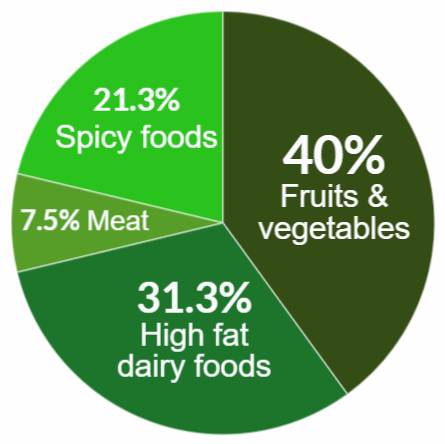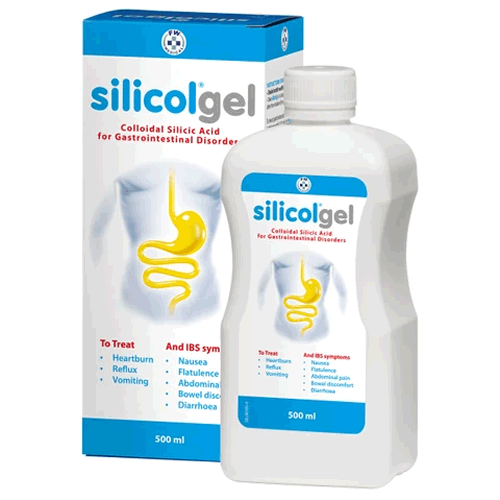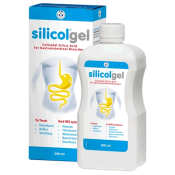How to eat with IBS
IBS can we unpredictable, painful and disruptive to your daily routine. There are a variety of factors in the diet which must be considered when deciding which foods are safe to eat, including:
1. Warm and cooked food is best
2. Fibre
3. Prebiotics and probiotics
4. Meal options
5. Snack attack!
6. Drinks
Read on to find out a bit more about how these factors affect IBS symptoms, and get some tips to help manage the problem.
What foods are bad for IBS?
Foods are a bit like friends. Some of your friends you really love, they're easy to be around and they never rile you up. Others are ok in small doses and preferably not when you're stressed...
Demanding foods tend to be wheat, dairy, refined sugar, and sometimes beans, nuts, and sulphurous garlic and onions. You may be ok with small quantities when you are feeling calm and can eat peacefully. Once you start having more of them, or try to tackle them on whilst on the move during a pressurised day, they can cause mayhem.
As several of these demanding foods are prominent in the average Western diet, it can be tricky to know what to have instead. Fortunately, there are plenty of options. Read on to find out the best foods to eat when your struggling with IBS.
1. Warm and cooked food is best
Firstly, a trick. Anything that you eat warm and cooked will be easier to digest than that same food cold and raw. For example, when you are prone to IBS, stewed fruit is easier on your digestive system than raw fruit. If you have it warm rather than cold it is even better.
This is because part of the digestive system's work is already done by the cooking process. Warm food is also less demanding on your energy reserves. Consider how comforting warm soups and hot drinks are when you are ill, and be kind to your insides.
IBS FOOD TIP: Add spices to stewed fruit!
Cinnamon supports your blood sugar levels, and ginger is warming and stimulating to your circulation. They are both delicious too.
2. Fibre
When it comes to IBS, fibre is one of the most commonly discussed food types. For some, a reduction in sources of dietary fibre is best. In other cases, you may find increasing fibre in your diet is more beneficial. It is important to consider the quantity and type of fibre you are eating.
There are two types of fibre:
• Soluble fibre can be found in foods such as oats, barley, seeds, fruit, root vegetables and soy. This is fibre that is easily digested. It dissolves in water, softening and bulking the stool thus helping with symptoms of constipation. As soluble fibre absorbs water it can also be used if diarrhoea is present.
• Insoluble fibre can be found in wholegrains, cereals, the skin of fruit and vegetables, couscous and brown rice. The insoluble fibre in the food you eat takes more time to be broken down by the digestive system. It does not dissolve in water and can help prevent constipation.
If you find you are experiencing adverse reactions to fibre you may want to consider including FODMAPs within your diet. FODMAPs are specific classes of carbohydrate, often found in fruit, vegetables and legumes. Many FODMAP foods are rich in fibre and, if this is where the problem lies, you can consider FODMAP friendly foods to obtain your dietary fibre.
IBS FOOD TIP: Try a fibre-rich recipe from our website!
Our Coconut and Cashew Amazeballs are rich in fibre, omega-3 and protein. They are nutritious and delicious, and require no baking so are extremely quick and easy to make!
3. Prebiotics and probiotics
Your digestive system contains billions of bacteria. This is known as your microbiota – these organisms occur naturally and reside in particularly significant numbers in your large intestines. We now know that they play a very important part in keeping us healthy.
Generally, we can categorise microbiota into 'good' and 'bad' bacteria. In order to maintain a healthy gut, it is important to support the good bacteria and ensure bad bacteria don't outweigh the beneficial effects of our friendly microbiota.
We can do this in two ways:
- Support the environment in which the good bacteria flourish by using prebiotics. Prebiotics are naturally occurring in many foods including onions, garlic, leeks, asparagus, Jerusalem artichoke and raw chicory root. L+ lactic acid is also an excellent prebiotic and can be found in fermented foods such as yoghurt, sauerkraut and fermented whey drinks such as Molkosan.
- Introduce probiotics straight into your system. Probiotics are the live friendly bacteria themselves and can be taken to top up the numbers present in our gut. Probiotics occur naturally in certain fermented foods such as yoghurt and kefir. They can also be taken as supplements.
The types of microbiota present in the gut can vary greatly from one person to another. Research has suggested that people suffering from IBS may actually have different populations of bacteria in comparison to someone without bowel symptoms.1
It is likely that 'bad' bacterial strains can take over the large bowel, giving rise to the undesirable symptoms such as bloating, flatulence, diarrhoea or constipation, commonly associated with IBS. Hence, maintaining the function of good gut bacteria is thought to be important if you have a functional gastrointestinal disorder such as IBS, as well as for your general health.
4. Meal options
A varied diet is less likely to cause problems as you will avoid overdosing on certain foods. The tendency is often to stick with a very limited range of foods due to fear that something different will spark off problems. This reduces your nutrient intake, so incorporating some low-risk options into your diet may be a beneficial idea.
Breakfast options:
• Porridge can be very sustaining. If you like it, try soaking oatmeal overnight in water or rice milk (or oat milk or almond milk) and then cook it up in the morning. This is quick and easy, and creates a breakfast that is more easily digested than porridge made with heavy duty jumbo oats. Add flavour and nutrient value with chopped dates, sultanas, and a sprinkling of nutmeg.
• If you love cereal for breakfast, try a rice or corn-based one (avoiding the types that are very high in refined sugar – try your local health store for better options), and warm up some rice milk or almond milk to top it with.
• Ever tried miso soup? It is very nourishing and sustaining, and good for weight balance and for reducing wind.
• If your bowel tends to be sluggish, soak figs, dates and prunes in hot water, leave overnight, and then blend to warm up in the morning. Have a serving with soya, almond or coconut yoghurt on top if you like it.
IBS FOOD TIP: Keep fruit away from your other food!
If you like fruit for breakfast, have it on its own, preferably warm and cooked, and don't eat anything else for an hour or so afterwards. This will reduce wind.
Lunch options:
• Have an avocado (or half if it's a large one) mashed with a drop of oil and a sprinkling of lemon juice. A pinch of freshly ground pink peppercorns can be nice too. You can mix the other half of the avocado with a little mayonnaise and use it for a rice cake topping later on in the day.
• A sweet potato baked in its jacket can be taken to work and reheated, or eaten as part of an evening meal. Fill it with roasted vegetables and a dab of coconut butter or a drizzle of olive or walnut oil. Sweet potatoes are faster to cook than ordinary potatoes and contain more nutrients.
• Soups are ideal, especially if full of chunky vegetables and eaten with oatcakes or rice cakes instead of bread. You can heat them and take them to work in a thermos if you don't have the facilities for heating at work.
• Try a corn tortilla instead of a wheat-based one as a wrap, as this tends to be lighter and easier to digest. Fill it with roasted vegetables, humus, guacamole, or pâté.
Dinner options:
• Try a spelt or wheat-free pasta instead of a wheat-based one. Rice noodles are extremely light and easy to digest, for example.
• Use quinoa or millet instead of white rice as a base for stews or curries. They are light, quick to cook, and if you cook quite a bit at once you can keep the rest for lunch the next day. They really don't weigh you down.
• Swap meat for fish if your bowel is sluggish, or you are finding yourself windy and bloated. Fish is lighter and more easily digested, as well as being quicker to cook.
• Don't be scared of beans and pulses, so long as they are well cooked. It's safest to use those that have been commercially produced (e.g. in tins), as they are ruthlessly cooked. Look for the versions that are sugar and salt-free.
IBS FOOD TIP: Don't swap meat for heaps of cheese!
Cheese can cause all sorts of chaos if your gut is feeling sensitive.
5. Snack attack!
It can be very easy to reach for an unhealthy snack, such as a packet of crisps or some chocolate biscuits, especially if there are no healthy snacks around you. Planning is vital! Make sure you have access to some of the following healthy, yummy snacks:
• Mini oatcakes are easy to carry with you
• Nak'd nibbles are now widely available and truly delicious
• Rice cakes and humus or pâté make a nourishing mini meal
• A home-made trail mix of your favourite nuts, seeds and dried fruit will sustain you over the afternoon hunger spot, and is unlikely to cause trouble if you chew it well.
IBS FOOD TIP: Chewing makes the world of difference to any meal!
Not only will you be fuller faster, but your food is far less likely to disturb your insides later on. And chewing is free! Get to it!
6. Don't let your drinks let you down
Caffeine triggers the production of adrenalin, which then switches off the digestive system. Therefore, nothing is easy to digest with the constant input of caffeine. It may be beneficial to try the following as an alternative:
- Green tea (good for your metabolism)
- White herbal tea (also metabolism boosting)
- Golden Rod tea (reduces fluid retention)
- Bambu Fruit and Grain Caffeine-Free Coffee (can be taken with milk for a soothing night time drink)
- Good old water! Add in a dose of Silicol® Gel if you want some added protection from any unwanted symptoms.
IBS FOOD TIP: Don't drink with your meals!
Swelling the contents of your stomach with loads of liquid spells disaster for your digestion. Leave it at least half an hour after food before drinking.
Lastly, a tasty broth to try
Here's a soothing, tasty broth to help heal a troubled tummy. Full of useful minerals such as potassium, magnesium and iron, and it is easy to digest. Don't blend it too thoroughly, so that it has some 'bite' on which you can practise your chewing!
Ali's Soothing & Healing Broth
Ingredients:
125g carrot, grated
125g celery, chopped
50g raw spinach, shredded
1 litre vegetarian stock
1 tsp agave syrup
1 tbsp chives, chopped
Cooking time: 35 minutes
How to make:
1. Add carrot, celery and spinach to vegetarian stock.
2. Bring to the boil and simmer for 30 minutes.
3. Add agave syrup and cook for another 5 minutes.
4. Blend and add chives as a garnish.
Liked this soup and want more delicious soup recipes packed with flavour and nutrients? From old classics to hearty soups with a twist, have a look at our soup page on the A.Vogel Food Hub. There are lots of tasty and healthy recipes for you to try.
Originally written on 24 March 2016 (updated on 16 December 2019)
References
1 https://www.ncbi.nlm.nih.gov/pubmed/17631127
What you said!
We recently ran a poll to find out which foods you find most troublesome for IBS. We've crunched the numbers and here are the results.
Results: Which foods do you find most troublesome for IBS?
40% of you said that you find fruits and vegetables to be most troublesome for IBS. If you suffer from this problem, perhaps try following a FODMAP diet to discover which foods are acting as triggers, and which foods you can class as safe and enjoy again!










